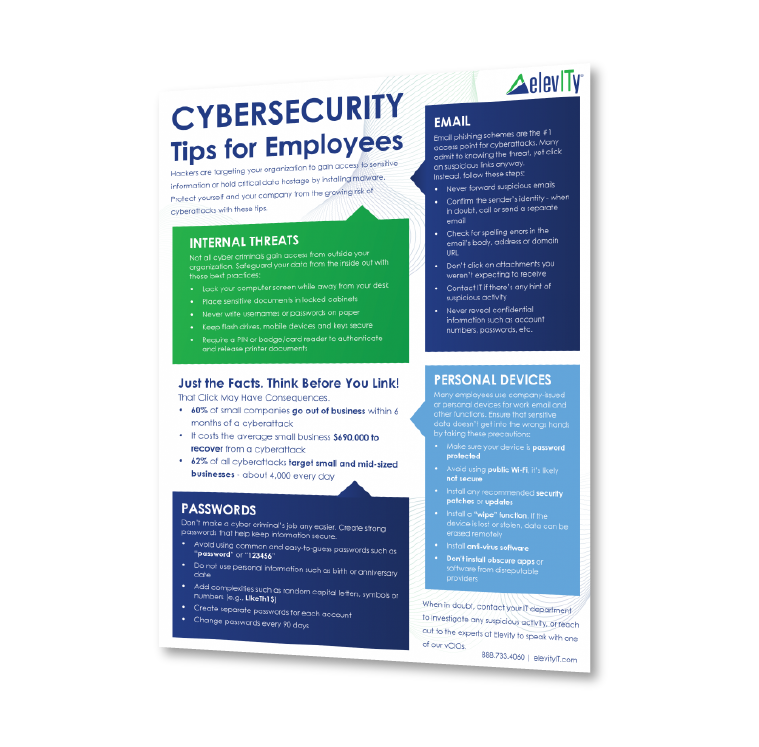Many people still ask, “What is cloud computing?” In a cloud computing environment, data is stored, accessed and maintained through an online platform. Instead of storing digital files on a hard drive or downloading office applications onto employees’ computers, files and documents are accessible through a secure online platform anywhere an internet connection is available.
“The cloud” is frequently referenced when discussing the future of technology, since it offers almost any company enterprise-level technology at an affordable rate. But the truth is, the cloud isn’t merely a future trend — it’s a dominant force.
Switching from a traditional IT setting with on-site servers to cloud technology is an easy choice for many, but it comes with advantages and disadvantages. When trying to justify cloud computing to your company’s leadership, you may be met with misconceptions from the early days of cloud technology.
Let’s set things straight. Here’s a combined list of 9 of the top pros and cons of using cloud computing that are relevant to businesses today.
Pros of Cloud Computing
1. Accessibility
Looking at the biggest pros and cons of cloud storage and computing, accessibility will always be toward the top of the “pros.” Where cloud computing really shines is helping to increase user access, providing greater accessibility across the board.
With its remote properties, the cloud allows access to any application in nearly any region across the world with just a few clicks on an internet-connected device. When you store data in the cloud, it even helps with recruiting efforts by opening up a pool of potential employees outside your area, allowing them to work remotely — which has become more critical in recent years.
2. Employee Collaboration
Thanks to the pairing of cloud technology and subscription services — such as Microsoft Office 365 — employees can collaborate more easily. No more looking over someone’s shoulder. No need to print endless hard copies. From a world away or even the next chair over, workers can work in a single document together while physically apart.
3. Productivity Boosts
With such accessibility and convenience comes a boost in productivity and overall efficiency. Time that was once spent downloading files to multiple computers or gathering everyone in a conference room to read through a document is now allocated for much more productive tasks. Within the cloud, work is streamlined and employees are no longer limited by a physical network.
4. Cost Efficiency
One of the most significant benefits of cloud computing is the cost savings that comes with migrating to a cloud solution.
Instead of investing heavily in servers and data centers, cloud users only pay for computing services they consume. Plus, they can easily scale if they need more data storage space. Cloud solutions also require less in-office IT equipment, saving on energy costs.
5. Disaster Recovery
Because of networked backups in the cloud, hardware failures don’t lead to data loss. The virtual server used in cloud computing is also hardware-independent, so the operating system, applications and data can be safely and accurately transferred from one data center to another. This significantly reduces recovery times and costs compared to traditional disaster recovery approaches, which require multiple servers to be loaded before data can be restored.
6. BYOD Policies
BYOD (Bring Your Own Device) policies are only possible with cloud computing. These policies allow employees to use their own devices to access company data and assets. BYOD has grown more appealing since the pandemic began, allowing for easier remote work options.
A reminder: BYOD policies will also require strong network security, so if you’re considering such a policy, remember to also invest in reliable virtual desktop services.
Further Reading: The Role of IT Support in Ensuring Data Security and Compliance
Cons of Cloud Computing
7. Security Concerns
Security and protection against data breaches and other cyberattacks often top the list of business owners’ main concerns about switching over to the cloud. By leveraging remote cloud-based services, a company is essentially outsourcing their data, so they’re trusting their provider to effectively manage and safeguard their information.
Many cloud experts believe that trusted cloud data centers, such as Amazon Web Services and Microsoft Azure, have better security than in-house data centers, so security risks of cloud computing are contingent upon the reliability of the provider. Users can also choose from public cloud, private cloud or hybrid offerings, depending on security needs.
When considering a cloud services provider, exercise due diligence and select a trusted, experienced and reliable provider with a proven track record of data protection.
8. Limited Control
Limited control is generally not a major issue with cloud services, but it remains a potential disadvantage. When a business moves over to the cloud, users have limited control over the function of their hosting infrastructure.
The concern here is that, while users are still able to control and manage applications, data and services, they have no control over the back-end infrastructure or technical issues. That’s a significant change for companies accustomed to a traditional IT system. Some businesses see this as a benefit of cloud computing, however, since this frees up the IT department to focus on other projects.
9. Downtime
While cloud service providers take many measures to prevent service outages, nobody is 100% immune. Cloud computing is internet based, so it can only be used with a solid connection. If the connection is disturbed or unavailable, the cloud can’t be accessed, leading to possible downtime.
This is another reason it’s important to choose a reliable cloud services provider with good customer service. If an outage occurs, you can be sure your provider will resolve the problem as soon as possible. With the right provider, cloud computing is still more reliable and consistent than in-house IT infrastructure.
Cloud Advantages Outweigh Disadvantages
Many experts believe cloud computing’s advantages outweigh its disadvantages and that the disadvantages are often mitigated or avoided altogether. Still, it’s always important to consider all your options when deciding which IT system — traditional, cloud-based or both — is right for your business.
A key element in successfully implementing secure cloud-based solutions — especially for remote workers — is a strong virtual desktop infrastructure (VDI). But you don’t want something that’s been cobbled together piecemeal over the years, like many VDI programs out there.
Instead, you’ll want to ensure any VDI solutions you turn to provide everything you need, including addressing security threats, device compatibility and more. Click the link below to access our eBook Advancements in Virtual Desktop Infrastructure (VDI) and learn about one of the top VDI solutions available: Microsoft Azure.





%20cropped.jpg)




